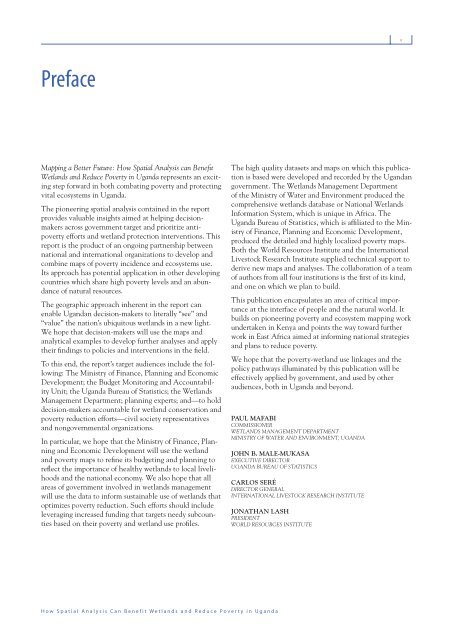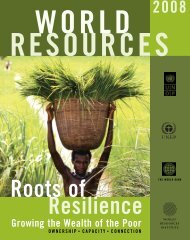Mapping a Better Future - World Resources Institute
Mapping a Better Future - World Resources Institute
Mapping a Better Future - World Resources Institute
You also want an ePaper? Increase the reach of your titles
YUMPU automatically turns print PDFs into web optimized ePapers that Google loves.
v<br />
Preface<br />
<strong>Mapping</strong> a <strong>Better</strong> <strong>Future</strong>: How Spatial Analysis can Benefi t<br />
Wetlands and Reduce Poverty in Uganda represents an exciting<br />
step forward in both combating poverty and protecting<br />
vital ecosystems in Uganda.<br />
The pioneering spatial analysis contained in the report<br />
provides valuable insights aimed at helping decisionmakers<br />
across government target and prioritize antipoverty<br />
efforts and wetland protection interventions. This<br />
report is the product of an ongoing partnership between<br />
national and international organizations to develop and<br />
combine maps of poverty incidence and ecosystems use.<br />
Its approach has potential application in other developing<br />
countries which share high poverty levels and an abundance<br />
of natural resources.<br />
The geographic approach inherent in the report can<br />
enable Ugandan decision-makers to literally “see” and<br />
“value” the nation’s ubiquitous wetlands in a new light.<br />
We hope that decision-makers will use the maps and<br />
analytical examples to develop further analyses and apply<br />
their fi ndings to policies and interventions in the fi eld.<br />
To this end, the report’s target audiences include the following:<br />
The Ministry of Finance, Planning and Economic<br />
Development; the Budget Monitoring and Accountability<br />
Unit; the Uganda Bureau of Statistics; the Wetlands<br />
Management Department; planning experts; and—to hold<br />
decision-makers accountable for wetland conservation and<br />
poverty reduction efforts—civil society representatives<br />
and nongovernmental organizations.<br />
In particular, we hope that the Ministry of Finance, Planning<br />
and Economic Development will use the wetland<br />
and poverty maps to refi ne its budgeting and planning to<br />
refl ect the importance of healthy wetlands to local livelihoods<br />
and the national economy. We also hope that all<br />
areas of government involved in wetlands management<br />
will use the data to inform sustainable use of wetlands that<br />
optimizes poverty reduction. Such efforts should include<br />
leveraging increased funding that targets needy subcounties<br />
based on their poverty and wetland use profi les.<br />
The high quality datasets and maps on which this publication<br />
is based were developed and recorded by the Ugandan<br />
government. The Wetlands Management Department<br />
of the Ministry of Water and Environment produced the<br />
comprehensive wetlands database or National Wetlands<br />
Information System, which is unique in Africa. The<br />
Uganda Bureau of Statistics, which is affi liated to the Ministry<br />
of Finance, Planning and Economic Development,<br />
produced the detailed and highly localized poverty maps.<br />
Both the <strong>World</strong> <strong>Resources</strong> <strong>Institute</strong> and the International<br />
Livestock Research <strong>Institute</strong> supplied technical support to<br />
derive new maps and analyses. The collaboration of a team<br />
of authors from all four institutions is the fi rst of its kind,<br />
and one on which we plan to build.<br />
This publication encapsulates an area of critical importance<br />
at the interface of people and the natural world. It<br />
builds on pioneering poverty and ecosystem mapping work<br />
undertaken in Kenya and points the way toward further<br />
work in East Africa aimed at informing national strategies<br />
and plans to reduce poverty.<br />
We hope that the poverty-wetland use linkages and the<br />
policy pathways illuminated by this publication will be<br />
effectively applied by government, and used by other<br />
audiences, both in Uganda and beyond.<br />
PAUL MAFABI<br />
COMMISSIONER<br />
WETLANDS MANAGEMENT DEPARTMENT<br />
MINISTRY OF WATER AND ENVIRONMENT, UGANDA<br />
JOHN B. MALE-MUKASA<br />
EXECUTIVE DIRECTOR<br />
UGANDA BUREAU OF STATISTICS<br />
CARLOS SERÉ<br />
DIRECTOR GENERAL<br />
INTERNATIONAL LIVESTOCK RESEARCH INSTITUTE<br />
JONATHAN LASH<br />
PRESIDENT<br />
WORLD RESOURCES INSTITUTE<br />
How Spatial Analysis Can Benefit Wetlands and Reduce Poverty in Uganda

















